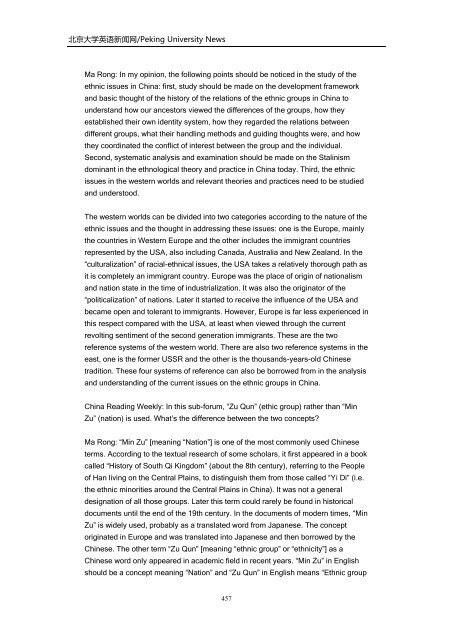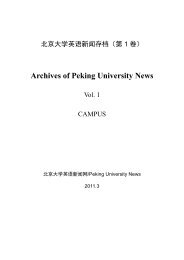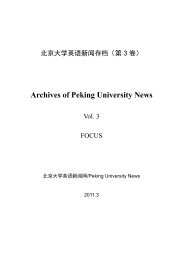Archives of Peking University News - PKU English - 北京大学
Archives of Peking University News - PKU English - 北京大学
Archives of Peking University News - PKU English - 北京大学
You also want an ePaper? Increase the reach of your titles
YUMPU automatically turns print PDFs into web optimized ePapers that Google loves.
<strong>北京大学</strong>英语新闻网/<strong>Peking</strong> <strong>University</strong> <strong>News</strong><br />
Ma Rong: In my opinion, the following points should be noticed in the study <strong>of</strong> the<br />
ethnic issues in China: first, study should be made on the development framework<br />
and basic thought <strong>of</strong> the history <strong>of</strong> the relations <strong>of</strong> the ethnic groups in China to<br />
understand how our ancestors viewed the differences <strong>of</strong> the groups, how they<br />
established their own identity system, how they regarded the relations between<br />
different groups, what their handling methods and guiding thoughts were, and how<br />
they coordinated the conflict <strong>of</strong> interest between the group and the individual.<br />
Second, systematic analysis and examination should be made on the Stalinism<br />
dominant in the ethnological theory and practice in China today. Third, the ethnic<br />
issues in the western worlds and relevant theories and practices need to be studied<br />
and understood.<br />
The western worlds can be divided into two categories according to the nature <strong>of</strong> the<br />
ethnic issues and the thought in addressing these issues: one is the Europe, mainly<br />
the countries in Western Europe and the other includes the immigrant countries<br />
represented by the USA, also including Canada, Australia and New Zealand. In the<br />
―culturalization‖ <strong>of</strong> racial-ethnical issues, the USA takes a relatively thorough path as<br />
it is completely an immigrant country. Europe was the place <strong>of</strong> origin <strong>of</strong> nationalism<br />
and nation state in the time <strong>of</strong> industrialization. It was also the originator <strong>of</strong> the<br />
―politicalization‖ <strong>of</strong> nations. Later it started to receive the influence <strong>of</strong> the USA and<br />
became open and tolerant to immigrants. However, Europe is far less experienced in<br />
this respect compared with the USA, at least when viewed through the current<br />
revolting sentiment <strong>of</strong> the second generation immigrants. These are the two<br />
reference systems <strong>of</strong> the western world. There are also two reference systems in the<br />
east, one is the former USSR and the other is the thousands-years-old Chinese<br />
tradition. These four systems <strong>of</strong> reference can also be borrowed from in the analysis<br />
and understanding <strong>of</strong> the current issues on the ethnic groups in China.<br />
China Reading Weekly: In this sub-forum, ―Zu Qun‖ (ethic group) rather than ―Min<br />
Zu‖ (nation) is used. What‘s the difference between the two concepts?<br />
Ma Rong: ―Min Zu‖ [meaning ―Nation‖] is one <strong>of</strong> the most commonly used Chinese<br />
terms. According to the textual research <strong>of</strong> some scholars, it first appeared in a book<br />
called ―History <strong>of</strong> South Qi Kingdom‖ (about the 8th century), referring to the People<br />
<strong>of</strong> Han living on the Central Plains, to distinguish them from those called ―Yi Di‖ (i.e.<br />
the ethnic minorities around the Central Plains in China). It was not a general<br />
designation <strong>of</strong> all those groups. Later this term could rarely be found in historical<br />
documents until the end <strong>of</strong> the 19th century. In the documents <strong>of</strong> modern times, ―Min<br />
Zu‖ is widely used, probably as a translated word from Japanese. The concept<br />
originated in Europe and was translated into Japanese and then borrowed by the<br />
Chinese. The other term ―Zu Qun‖ [meaning ―ethnic group‖ or ―ethnicity‖] as a<br />
Chinese word only appeared in academic field in recent years. ―Min Zu‖ in <strong>English</strong><br />
should be a concept meaning ―Nation‖ and ―Zu Qun‖ in <strong>English</strong> means ―Ethnic group<br />
457




